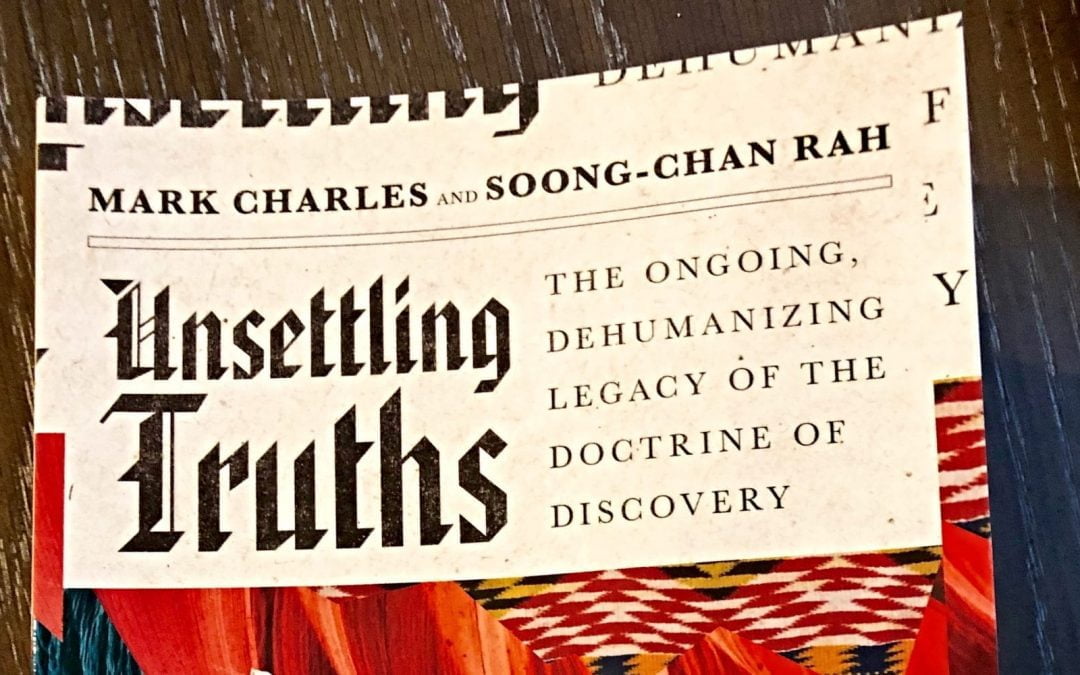Truth can be unsettling. That’s why so many ignore it in favor of false but more comfortable narratives.
For those who dare to face uncomfortable truth – since Jesus said such is the key to personal and spiritual freedom – there is a new resource worth reading: “Unsettling Truths: The Ongoing, Dehumanizing Legacy of the Doctrine of Discovery” by Mark Charles and Soong-Chan Rah (2019, InterVarsity Press).
This is not a feel-good book, but one that especially white American Christians need to read.
As the authors affirm, “The absence of truth has resulted in the presence of injustice.”
Those of us raised to be patriotic Americans and devout Christians (and often conflating the two into a form of civil religion) tend to be more defensive and less self-critical than is constructive.
It is hard to admit that much of what we were told about America and the Christian church here – while growing up in church, school and home – was largely wrong.
Columbus didn’t “discover” America. The Pilgrims didn’t come to these shores to produce religious freedom for all.
The Founding Fathers weren’t a bunch of conservative Christians enshrining a church covenant and 1950s Protestant family values into the nation’s founding documents.
Removing Native Americans from their lands and putting them on a forced death march was not an act of Christian mission and evangelism.
As a result of such narratives – intent on disguising greed, racism and other forms of evil – a Jesus-centered understanding of the kingdom of God gave way to a national tale of American exceptionalism and religious triumphalism.
These authors pull off the masks – offering historical accuracy and personal accounts from their own heritages.
They show how the American church’s “adultery is with the empire.” The lies are left bare.
“This obsession with the self-evaluation of the American church and American society reflects an absence of truth-telling,” they write. “The American church has yielded the prophetic voice because it has not spoken a historical and theological truth.”
In particular, the authors explore the Doctrine of Discovery and Manifest Destiny – that offered divine justification for seizing lands from and committing all kinds of atrocities against non-white, non-Christian peoples – and the continuing impact on the United States.
Therefore, there is no call for reconciliation, but conciliation – since justice based on equality and full human rights has long evaded us.
While the truths revealed within this book are uncomfortable and unsettling, they offer more than a guilt-filled flogging.
A much-needed perspective can lead to the conviction of sin and a reorientation of purpose and practice – for those willing to endure such spiritual cleansing.
The path is a good, though not easy one. “We will call our nation and the Christian churches of our nation to a truth-telling that will begin to shed light and open the door to a future hope.”
If anything is a biblical and spiritual exercise, it follows that well-lit, but lesser-worn path of truth, light and hope.
Consistent with Nurturing Faith’s Jesus Worldview Initiative, the authors reveal “the absence of Christ within the heresy of Christendom.”
Indeed, Jesus gets left behind when the religious faith that bears his name embraced a nationalistic ideology in contrast to what he taught and how he lived.
From Constantine to Franklin Graham, we find evidence of European/American Christian supremacy that has become commonplace in our church and society.
“The assumption of white supremacy took root in the imagination of the Western mind,” the authors write. “This imagination and narrative have become embedded realities in the American Christian worldview.”
Indeed, it has. And, therefore, the hard path of truth, light and hope awaits us.
That is, for those who dare to follow Jesus.
Editor’s note: A version of this article first appeared on Pierce’s blog. It is used with permission.
Director of the Jesus Worldview Initiative at Belmont University in Nashville, Tennessee and former executive editor and publisher at Good Faith Media.


